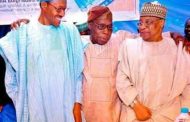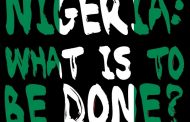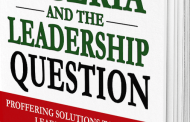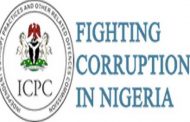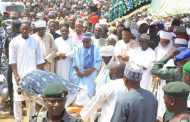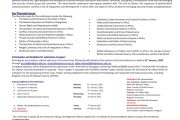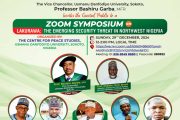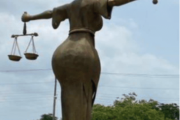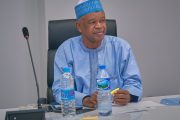The power elite in Nigeria has gotten used to wangling its way out of cross roads that it might not have anticipated the Buhari complexity before it now, whether he contests in 2019 or repla... Read more
Alhaji Lawan Daura, the Director General of Nigeria’s domestic spy agency, has been sacked. It cannot but be in connection with the wonderland performance that greeted Nigerians as they woke... Read more
The fragmentation within the elite crust took what many would regard as its most frightening turn Friday with the National Christian Elders Forum (NCEF) declaring at a press conference that... Read more
The vicious struggle for the soul of Nigeria has, fitfully, finally and formally staggered onto the streets. Now, everyone, even the blind, can see it. If it is not in the volley of well aimed verbal missiles issuing from The Presidency on all cylinders, signifying a President Muhammadu Buhari on the move for 2019, rhetorically and otherwise, then it must be in the pot-shots on the Presidency, particularly the ones fired from Kano and Kaduna. Elder statesman, Alhaji Tanko Yakassai said the president has been successful only in noise making. As one of the very few living traditional politicians with Left background, it would not be surprising if quite a number of people did not sleep in the Villa that night. He was followed by Sheikh Abubakar Mahmud Gumi saying the president is held hostage by mad people. These are considered significant statements in terms of the pattern of ruling class constellations unfolding. But the president is soldiering on nevertheless as we shall see below.
Meanwhile, disagreement within the ruling party has spilled onto the streets. Clearly, the battlefront which has opened between the Senate President and the Executive Arm is crossing the red line of power struggle by presenting Nigeria to the world as a country whose Head of the Legislature had anything to do with armed robbery. That may be good for some people but it stretches the image of the country too thin. To undo that dent now would take years and lots of efforts because it constitutes a big flash on the screens of researchers compiling indicators of instability across the universities, think tanks and researchers, INGOs and other new such actors in global security.
There is no knowing what the outcomes would be when added to other sites of rupture such as the continued killings, (Ekiti, Benue, Edo, Plateau, Zamfara, Nasarawa and Kogi last week); rupture in the ruling party where the contest of power between the legacy components and the n-PDP has blown up to near irreconcilable dimension and, of course, the intensified search for a consensus candidate to fight out the election between the incumbent and such an entrant.

 Notwithstanding the commotion, the president is soldiering on. How far it would go is not clear but, for now, the president who had nothing to say (or, was he bidding his time?) as very tragic events unfolded between January and March in particular now appears to have found his voice at last. Corruption is the organising concept of his move but he is weaving other claims in the process. Two of them are most interesting. The first one, now most forcefully and more regularly articulated, is his contention that it is those who stole public resources who are organising chaos. By that, he means that the herdsmen involved in the violence across the country are actually ‘herdsmen’ or organised players by the people he is pointing fingers at. Interestingly, this was not his initial theory. The sequence of his intervention has been silence, armed herdsmen, Gaddafi killers before the new theory. Perhaps, presidents also adjust theories.
Notwithstanding the commotion, the president is soldiering on. How far it would go is not clear but, for now, the president who had nothing to say (or, was he bidding his time?) as very tragic events unfolded between January and March in particular now appears to have found his voice at last. Corruption is the organising concept of his move but he is weaving other claims in the process. Two of them are most interesting. The first one, now most forcefully and more regularly articulated, is his contention that it is those who stole public resources who are organising chaos. By that, he means that the herdsmen involved in the violence across the country are actually ‘herdsmen’ or organised players by the people he is pointing fingers at. Interestingly, this was not his initial theory. The sequence of his intervention has been silence, armed herdsmen, Gaddafi killers before the new theory. Perhaps, presidents also adjust theories.
The more pointed shots were fired earlier on May 15th, 2018 at the commissioning of the new office complex of the EFCC where he declared that corruption itself overthrew him in 1985. In other words, the masterminds of that coup were on a corruption-inspired mission. Whao! Not quite a few clapped for him even as they wondered why he never began to harp on this until the onset of the campaigns.
Agreeable or not agreeable, alleged corrupt politicians across the country are being hauled into the courts, most of them ending up in jail for at least a week or so. It is a powerful way of imposing a moral censure on the individuals involved because, being arraigned for corruption diminishes anyone, whether he or she is found guilty or not guilty. It must, therefore, have been carefully planned over time to coincide with the onset of campaigns. The initial arrows in the direction of Chief Olusegun Obasanjo, one of the angry godfathers, does not appear to be flying yet. It has only fetched the president a put down by General Obasanjo. But, who knows, there might be more of such disclosures. Some snippets have started circulating in relation to General Abdulsalami Abubakar although that one has not been such a vocal member of the cohort, (the club of four or five retired Generals wielding tremendous power in the country, formally and informally) against the president’s second term bid. It could be that a friend to an enemy is an enemy. Meanwhile, not a few are sure that before long, former Vice-President Atiku Abubakar might get his own share of the anti-corruption firing. And so on and so forth!
The contradictions appear to have worked out in a manner that corruption is the issue framing the current intra-class warfare in Nigeria. Pessimists say that could be the eve of anarchy because the conflict parties appear so balanced and victory or defeat could be too costly. Optimists say the warfare is what would trigger or catapult Nigeria into a more qualitative era. Whichever line one follows, it would appear to be that, after four epochal wars against corruption in recent memory, (Murtala/Obasanjo purge in the mid 1970s; the 1983/4 arrest, detention and trial of several politicians of the Second Republic by the 1983-1985 Buhari military regime; the setting up of the EFCC in 2003 and the current phase), thesis and anti-thesis are about to build up into a synthesis although why this heightened dimension is coinciding with the eve of election is something many people are unable to explain or understand.
If it is true that on presidential agency does the future of Nigeria substantially lie, then the bigger problem remains. There is a strong belief here and there that an overwhelming opponent can defeat the incumbent hands down if the election is all a matter of first-past-the-post. But who might be that overwhelming candidate, with capacity for qualitative and nation building governance in an extraordinarily plural Nigeria?
After Ibrahim Dankwambo, the PDP governor of Gombe State, there are hardly any new names emerging yet although one of the angry godfathers might come up with a dark, dark horse. That is a strong possibility. Former Vice-President Atiku Abubakar is right in the race. He has even started appointing the henchmen of his campaign. Until the dark horse is unveiled, each of the two is gathering moss. With the frequency of movements between the Northeast and the South-south nowadays, something would appear to be clicking. Governor Dankwambo might be lucky, not being vulnerable in any way to the anti-corruption shelling because he has immunity till the end of the Buhari regime in May 29, 2019. Should he declared elected, there is no chance of anybody arresting him before midnight of May 2019 and by which time he would have become Mister President and come under a stronger immunity. That is if he has any allegations of corruption against him. Right now, none is known to the public yet. But with what more progressive doctrine of power is he ever associated with? Some people are crediting him with being the designer of the TSA mechanism when he was Accountant-General of the Federation about a decade ago? So, would his be the arrival of a technocrat in power? Is that the presidential agency Nigeria needs today? Only time will tell.

President Paul Kagame at a session of the Next Einstein Forum

Ahmed Abiy, New PM of Ethiopia also went to the ideas based Next Einstein Forum
What about the dark horse? Not much is known about him yet beyond that it is a he, not a she. The assumption is that any dark horse coming into the fray must be more formidable than anyone already in the race. Again, only time will tell. Lastly, Atiku Abubakar! He is rated to have the cash and the capacity, although the substance of the capacity has not been interrogated. He has started quoting Lee Kuan Yew, the late Prime Minister of Singapore routinely cited as the ultimate example in compacting an extra-ordinarily diverse city-state as Singapore and transforming it from a ‘Third’ to a First World. But does Atiku subscribe to Yew’s categorical discourse of social transformation in the idea of a fair as opposed to a welfare society? If he says he does, has he got how such a doctrine can be operationalised in Nigeria?
It is not impossible for a swing in choice to occur because of the multiple calculations of the powerful local, regional class and global interests and their agents in the negotiations going on here and there on 2019. Surprises could still occur just as some stars could fade, some to the dynamics at work and others as damaged brands in the anti-corruption warfare. But the strategy of damaging brands could equally be counter-productive because in an angry and acrimonious country like Nigeria of today, one person’s damaged brand could be another person’s model. And some people could be decisive in electoral outcome, even from jailhouse.
President Paul Kagame of Rwanda is a dictator. That is the sort of thing one hears more frequently about him but he is a dictator who has delivered development to a society that went through genocide. A 43 year old young man has just taken over power in Ethiopia, an ancient African State and, so far, everyone is saying that if he continues the way he is going, Ethiopia would soon be alright. What is he doing right? Educated or informed governance, manifesting in how he dashed to flashpoints of discontent and mellowed hardened hearts! By education, we do not mean PhD but political education. In Nigeria, no one ever comes to power with a self-understanding that proclaims a categorical contention about what the country should be like. All of them come to power talking about development in terms of mega and mini projects without EVER talking about an overarching framework. None! The latest is President Buhari who gave the impression that he was a statist. After three years, it is not clear if the regime has anyone there who has ever heard about the word statism. Might this country have been cursed?
In a major move reminiscent or replicating of spreading the fields of contestation that marks its global counterpart, the civil society in Nigeria is massing up against what it sees as threa... Read more
With just two months to go for the opposition caucuses headhunting for a political figure who can beat an incumbent, who or with what list are they working? This is the key question in Nige... Read more
Injury time is staring the effort of five main caucuses, individually and collectively, headhunting for a candidate with the political personality, track record and acceptability across Nige... Read more
A list of allegedly corrupt persons is circulating fast on the social media but without anyone claiming to have released it, raising a number of questions: Is it possible this was the origin... Read more
By Adagbo ONOJA By what stretch of imagination would anyone call someone who was before the Economic and Financial Crimes Commission, (EFCC) a great man? Or, how could a governor who could n... Read more
By Adagbo ONOJA Alhaji Aliyu Akwe Doma, governor of Nasarawa State from 2007 to 2011 is dead and has been quietly buried in his place, Doma in Nasarawa State of Nigeria. At stake in this pie... Read more

